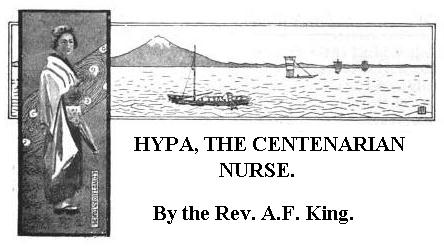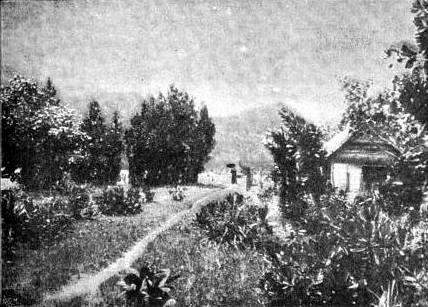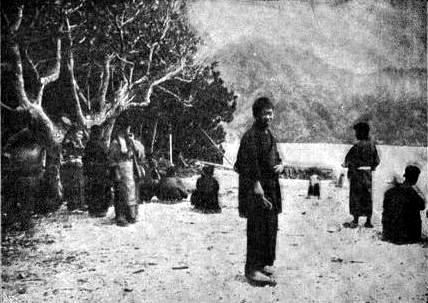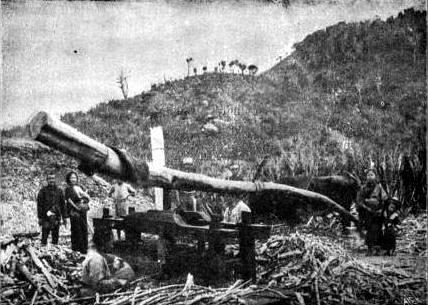|

HYPA, whose story we are to tell, was a native of the Caroline Islands in the mid-Pacific. By her own account the name of the island in which she was born about the year 1785 was Imofek, though some give it as Punapi and others as Raven Island.* At the time of her birth her people had scarcely any intercourse with the outside world, and none of them had any knowledge of the true God. One superstitious practice common among them was the worship of fresh-water eels. Of Hypa's parents nothing is known except that they were aborigines of the island, and that Elilipaha was the name of her father and Kahanpan the name of her mother. Hypa was married when quite young to one of her own people on the island, but the husband seems to have died shortly after the birth of the second child. To the young widow's great sorrow both her children also died about the same time, or it may be a few years later. After this follows a long period in her story which must be filled in by the imagination. As we are here concerned only with facts, we must pass it by in silence. Hypa emerges from this obscurity about the year 1846 as the wife of one Bill Mann, a seafaring adventurer, and said to have been by birth an Englishman. We first meet with them in the mid-Pacific on board a whaler called the Howard. Among others on board were their friends George Robinson and his wife Teapa with two little children. Robinson was an Englishman, but Teapa was a native of the Caroline Islands, and had been brought up and nursed in infancy by Hypa herself, now already over sixty years of age. The Howard had sailed from the Carolines or some other of the South Sea Islands northward, and it first really comes into our story as it reaches the beautiful harbour of Peel Island, formerly known as Port Lloyd. This island is one of the Bonin group, and lies about 500 miles south of Yokohama. There the party disembarked and threw in their lot with the few English-speaking settlers who had gradually collected in the island since 1831. Peel Island, however, did not seem to offer much opening for the new comers, and after about a year they went across to * Hypa's name is sometimes spelt Hypha, and the late Mr. Russell Robertson, in his article on the Bonins in the Japan Asiatic Society's Transctions (1876), spells it "Zipher." It is he that calls her "a native of Raven Island." Source |
on his farm, but, in this, as we shall soon see, he was grievousLY disappointed. The whole party journeyed together towards their destination on a whaling ship known as the Arctic. The captain of this vessel became enamoured of Robinson's eldest daughter, and before the voyage was out had secretly made her his wife. It was probably his purpose to come back and claim her when his ship had finished its whaling expedition. As a matter of fact he did not re-appear until the girl had given herself to a second husband, but of this anon. When Robinson and his party landed on South Island, they found a man named Moitley had settled on the farm, and had no intention of  SCENE IN THE BONIN ISLANDS.giving it up. This led at once to ill-feeling on both sides, though at first there were no signs of open violence. Little by little, however, the quarrel assumed serious proportions. The Kanakas who had come with Robinson all sided with Moitley, while a man known by the name of "Rob" who had been working for Moitley took the part of Robinson. Some time early in the year 1860 things came to a head. The Kanakas first attacked Rob. He defended himself for some time in the cleft of a rock, but was eventually overpowered and killed. Robinson fied for his life into the bush with three of his children; Hypa also in another direction fled with the remaining three. Those with Hypa |
were the eldest girl, the second boy about seven, and the youngest girl about two years old. Moitley told the Kanakas to go in pursuit and kill Robinson. They caught him and the three children with him, but instead of killing him brought him and his children back to Moitley's house. Moitley, happily, refrained from further violence, and not long after persuaded the captain of the Montreal, a ship which was calling at the island, to take Robinson with the three children and land them at Honolulu, whither the ship was bound. Neither he nor any of the three children ever returned to the Bonin Islands. Meantime, Hypa had safely eluded the pursuers, and with her party of three had made her way to the other end of the island, not more perhaps than five miles away from Moitley's house. She was quite determined come what might, and the eldest girl was of the same mind, that they had better die of starvation than venture back to the neighbourhood of the farm. It will hardly be believed that for eleven months the little party of refugees kept themselves alive and in good health in the bush. Hypa of course knew better than most how to manage, as her early days had been spent on an island where the conveniences and comfort of modern life were quite unknown. She was equal to the occasion. They built a hut of the leaves of the cabbage palm. They made fish hooks of some old nails they found in the broken pieces of junk on the sea shore, and Hypa made fish-line of her own hair. Besides fish there were bananas (or plantains) in abundance, and occasionally they dined off turtle. Hypa found no difficulty in getting fire by rubbing pieces of wood together in the way known to those who have not been brought up on lucifer matches or even flint. It does not appear they had any thrilling adventures during the eleven months' sojourn in the bush, and no serious attempt was made on the part of Moitley and the others to search for them. Perhaps they thought they had made their escape to one of the other islands. The eldest girl gave birth to a son after they had been in the bush for a few months. and this must have added considerably to Hypa's anxieties. The child, who was born on its mother's birthday, December 10, 1860, grew up to manhood and died in the year 1889. After they had been nearly eleven months in the bush a Whaler named the E. L. B. Jenny called at Moitley's bay, and her captain, whose name was Marsh, happened to hear the story of the flight of Hypa and the Robinson children into the bush. When he had taken in his cargo, he cruised round the island on the chance of being able to rescue them from their life of involuntary exile. Hypa saw the vessel and with a happy instinct determined to signal it. She lit a big fire which soon attracted Captain Marsh's attention. He soon had them all safely |
on board, and sailing across to Peel Island, landed them at a spot known as Little River. A settler who lived there, an Englishman, said to have hailed originally from Wallington in Surrey, offered a temporary home to the wanderers, and this was gladly accepted. The eldest girl, in her ignorance and darkness, not long after consented to become the wife of the hospitable settler. Her first husband, if so he is to be called, is said to have re-appeared at some later period. By her husband at Little River she had no less than eight children. All of these were cared for by Hypa, who was looked upon as part of the family, and a very indispensable part too.  ON THE LANDING STAGE.In the year 1881 the father died and the home at Little River was broken up. Of the children the eldest daughter was married not long after her father's death to a son of the leading settler in the island, and Hypa who was very fond of her was allowed to follow her to her new home. Hypa was now about ninety-six years old, according to calculations which may be considered sufficiently satisfactory. Though so far advanced in years, she yet showed considerable vitality. Her fondness for children was remarkable, and those who remember her will tell you how a child would be quiet and sleep in her arms almost the whole day if allowed to do so. She had a peculiar way of swaying her body and soothing the child to content and sleep. It was a happy thing for her |
that the young couple in whose house she lived were blessed with four or five children, all of whom learnt to look upon Hypa as their dear old nurse. The long life was now drawing to a close. It had been lengthened, it may be, in mercy that her faithfulness might receive the seal of God's approval. Hypa, as we have seen, had been brought up in the gross darkness of aboriginal superstition in one of the South Sea Islands. Of the settlers and others she had fallen in with in later life there was not one who knew much about the true religion, or who troubled to teach her until the very evening of her life drew on. She had a reputation for entire trustworthiness, and was never known to steal or tell a lie. In a word, according to her lights she was a truly faithful woman. But it came to pass that a few years before she died there arose a revival of true religion among the few settlers in the island, chiefly through the earnestness of one young man whose name was Joseph. This was followed by brief visits to the island of two clergymen from Tokyo. and a longer visit of two Christian ladies, a mother and her daughter. All these efforts by God's grace led to the manifestation in many of real repentance towards God and faith in our Lord Jesus Christ. When Hypa saw all this and heard about the Christian services that were being held she began to be interested and asked what it meant. We must remember that Hypa was not only now far advanced in extreme old age, but had never acquired suflicient knowledge of English to understand any except the simplest sentences, and only those who had been brought up by her or had lived in the same house with her could understand her broken language, half English, half Kanaka. But two of the women who knew her best occasionally spoke to her about the true God and why they went to worship Him. Her faithfulness as a nurse and this little teaching was all the preparation she can be said to have had, when in September 1897 she fell seriously ill. Exactly what was the matter no one knew, but – odd though it sounds – it is believed by some that she was suffering from an attack of suppressed measles, as almost every one on the island had been down with it. The two women, who had before spoken to her about God and His Son Jesus Christ, went to Joseph (who had some little time since been duly licensed as catechist in the island by the Bishop of South Tokyo, in connection with the Society for the Propagation of the Gospel), and asked whether he thought she might be baptized. Joseph went at once and spoke to her. He asked her whether she had given up her old superstitions. Yes, she had: she believed now in the God in heaven. Did she believe all that those who had been trying to teach her had said? Yes, she thought the greater part was true. Did she wish to be baptized? Yes, she desired it. She was now in extreme weakness, and Joseph felt he must, in the absence of a clergyman, decide at once. He inclined to |
the side of mercy, and though he felt her knowledge of the true God and of His Son Jesus Christ was yet only dim, he baptized her in the name of the Father and of the Son and of the Holy Ghost. She lingered a few hours longer, and died in her sleep on September 9, 1897, aged about 112. She was buried with the Church of England service, her body being taken first to the school-house, which the settlers have built and use for services as well as for a school. Besides the English-speaking settlers large numbers of Japanese, who have in recent years come to the island, followed her to the grave. From her extreme age Hypa had become a  MILL FOR CRUSHING SUGAR CANE.marked figure among them also, and some of them used to speak of her as the greatest wonder in the Bonins. A plain wooden cross stands at the head of her grave in the little cemetery overlooking the modern town of Omura about two miles distant from the house where she died. That sign bids us believe that by God's overflowing mercy she died "In Christ." As an infant just baptized and gone, so it was with poor faithful old Hypa. Baptized almost as if she had been a little child though with her hundred and twelve years upon her, she passed we may surely hope into the presence of God, washed white in the Blood of the Lamb. |
Source:Rev. A. F. King. "Hypa, The Centenarian Nurse" Mission Field,
Images may be found at Google Books.
Last updated by Tom Tyler, Denver, CO, USA, January 13, 2025.
|
|